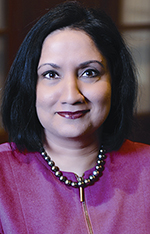HOME | ABOUT US | MEDIA KIT | CONTACT US | INQUIRE
HOME | ABOUT US | MEDIA KIT | CONTACT US | INQUIRE
Regional MBA and undergrad programs alike are bending to the influence of a global economy.

Singapore. Iran. India. All of them are a fair distance away from Kansas City—but influences from all three nations, and many more, are at work on business education in this region—at public and private universities, at MBA-level and undergraduate programs, and in the academic programming, student bodies and administrative levels.

Neeli Bendapudi, dean, University of Kansas School of Business
“Our students don’t need to travel overseas to meet international business connections; they’re in the classroom with them.” Brad Kleindl, dean, School of Business, Park University
A global economy, it turns out, implies for a strong need for global education in business.
Singapore, of course, produced Teng-Kee Tan, dean of the Bloch School of Management at UMKC since 2009. In April 2011, Neeli Bendapudi, a native of India, was named dean of the University of Kansas School of Business, and less than three weeks later, Ali Malekzadeh, a U.S.-educated Iranian, became her counterpart at Kansas State University’s College of Business. All are part of a trend that is preparing new graduates to compete effectively in a new world business order.
Tan, with the longest local tenure of the three, has had a pronounced impact on the Bloch School, said David Donnelly, who is filling in while his boss is on extended leave.
“Dean Tan brought with him a tremendous understanding of globalization; he lived it, it became part of his life,” Donnelly said. “His mindset is global, and for him, it’s what management education is about. That sense—he helped incorporate into the thinking of the Bloch School, embedded it into our strategic plan. He focused on what it means to be a global educator, identifying opportunities to become leaders in certain aspects.”
Donnelly could have been speaking for most any regional business program when he said, “you don’t sit back and wait to become a player in global education. The opportunities are there now, and you have to identify them and go after them. If you wait, your programs are in peril.”
Setting Sail
Perhaps the most obvious change for students has been the broad adoption of classes that require studies abroad. For working professionals, KU is created a certificate in international business management, said Bendapudi, and she believes that “is a very powerful signal to the market. To get that, we have study-abroad options all over the world.” That includes a longstanding partnership with the ESC Clermont Business School in France, where as many as six students each year travel for studies. Other ties are with institutions in Costa Rica, India, Germany, Italy, Brazil, Mexico and China.
At K-State, it’s much the same said Stacy Kovar, associate dean for acade-mic programs in the business school. “We have long required, in our face-to-face MBA program, that students have at least one international experience—a course, a travel-abroad experience—where they go and see the business environment and experience the culture,” she said.
A recent program modification calls for students to travel as a cohort to another country, Kovar said, “not only visit business, but they’ll work together to solve real problems related to one of those businesses.”
In Columbia, said Joan Gabel, dean of MU’s Trulaske College of Business, the EMBA provides a rigorous MBA curriculum through global consulting paired with online and on-campus coursework, and includes an international residency in Santiago, Chile. “Though some of our students come to the table with an understanding of global business,” Gabel said, “others are experiencing for the first time
the opportunities available to them.”
Smaller colleges and universities are getting in on the action, as well.
Benedictine College in Atchison has a tie-in with the University of Maastricht in the Netherlands, which has a heavy focus on health sciences. The medical school there features one of only three 9-Tesla MRI units in the world, said Dave Geenens, director of the school of business at Benedictine, and with that distinction, “we can leverage the research capability of the school to benefit business.” Students, he said, come away with an understanding of how academic research integrates into private practices.
The cross-cultural benefits for students, administrators say, also cut both ways: An infusion of international students, who still regard an American-issued degree as the gold standard—develops skills they hope to take home with them upon return, and helps lay the foundation for relationships with their peers here.
In fact, the numbers of international students at Park help bring that foreign-business dynamic into classrooms here, Kleindl said. “We have a large number that we brought in as part of normal recruitment, and because they are so heavily represented in business courses, it gives our faculty the opportunity to integrate their experiences into the classroom,” he said. “Our students don’t need to travel overseas to meet international business connections; they’re in the classroom with them.”
The MBA program, he said, was a good example of that. The global EMBA sequence brought in seven Chinese executives this summer, with more coming in the fall. “Then we’ll be opening the EMBA global focus to executives who are not from China, those from the greater Kansas City region who want to get involved with that truly global classroom experience with the Chinese execs.”
Among students enrolled in the region, the foreign influence is getting stronger, as well.
“In the past five years, the international student population is up about 19 to 20 percent, and I expect that to continue, probably another 15 percent or so,” said the Bloch School’s Donnelly. “It’s surprising, but the exchanges take place in a variety of ways, and one of those is on teams. As long as they’re designed to use the cultural differences each group brings to the table, it can be a powerful learning experience.”
Those experiences are highly relevant to modern American business, even in the nation’s heartland, said MU’s Gabel. “Despite our Midwestern location, students, many will work for companies that have international locations, a global client base, multinational teams, et cetera. Though our graduates may not necessarily begin their careers abroad, we want them to have the tools they need when the opportunity arises.” In fact, she said, companies such as Caterpillar offer substantial international opportunities, despite their Midwestern base.
Coming to America
Even through the bigger-name universities on the coasts and Ivy League schools can command the top tier of foreign students, Donnelly said, “the students we get here are extremely talented. They are very bright individuals who challenge our own students from a knowledge standpoint. They bring great ideas, and that elevates the classroom environment.”
Bendapudi, whose familiarity with Lawrence dates to her father’s studies there as a Fulbright scholar in the 1960s, also sees that diversification as something that adds to classroom discussions. “One advantage we have at KU is that, I believe, we have students from over 100 countries” enrolled, with many of those nations represented in her programs. “That’s something we pay attention to with the students we admit, so they truly come do Kansas from all over the globe.”
More broadly, she said, the growing global demand for business education is putting pressure on U.S. schools as a group to compete with emerging programs in other nations. “With the number of students attracted to the U.S., it’s much more competitive than ever before,” Bendapudi said. “It’s a combination of the local schools in those countries becoming better, investing in the technology, and schools in the U.S. are going abroad to set up beachheads in those countries.”
Yet within that demand, Donnelly said, opportunities abound. “In other countries, the need for higher education is dramatic,” he said, pointing to China and India, where the ranks of the middle classes are swelling by the tens of millions. “There is a need in the tertiary educational opportunities of universities, graduate programs and executive programs. And those pose some tremendous opportunities for schools. But developing countries are investing a lot in their own universities, and their own nationally recognized graduate programs.
“The environment is getting competitive for the very best students; they’ll compete for ours, as we do for theirs. That’s a trend that’s probably going to continue.”
Money Talks
There are, however, additional costs associated with that keeping up in that educational arms race, Donnelly noted. “There’s an investment that must be made,” he said. “And you’ve got to build those relationships now; you have to distinguish yourself if you want to build that audience.”
Adding in mandatory trips overseas and recruiting higher-salaried foreign instructors does indeed leave a mark when it comes to managing the cost of business education. But Gabel noted that MU’s Crosby MBA has been ranked No. 1 by Bloomberg Business Week for the ROI realized by graduates, even with those added costs. And as Bendapudi noted, KU—like most universities—has set up special funding to help students offset those higher costs.
The bite can be particularly tough for students already dealing with generally higher tuitions at private universities. Adding in the Maastricht experience for students at Benedictine “added about $4,000 to the cost” of the program, Geenens said. “But we look at the return on investment to our students and believe it pays off in spades because the exposure and experience is spectacular,” he said. “The exposure to that faculty, to have their professors teach our students, and to their students, where our professors are teaching them, is invaluable.”
And, as Kleindl noted, there are programming options that can help address the academic requirements without physically being overseas.
“For our undergrad program as part of the international business degree, we require an international experience component to that, but that could be an internship with a company in the Kansas City region that truly is involved with international trade,” he said. “For students who can’t travel, that is an option.” And enterprising students, he said, have found ways to offset the costs of foreign travel by contracting with local companies to cultivate contacts while they’re traveling and bring back business cards from executives in other countries.
Among the other cost drivers involved, noted Kovar, “the cost of faculty with the right experience to bring value to students” is significant. “You have to pay competitive salaries—it’s very expensive not to do that,” she said. “You can focus domestically, but it’s critical they get a valuable education to give back to the Kansas economy.”